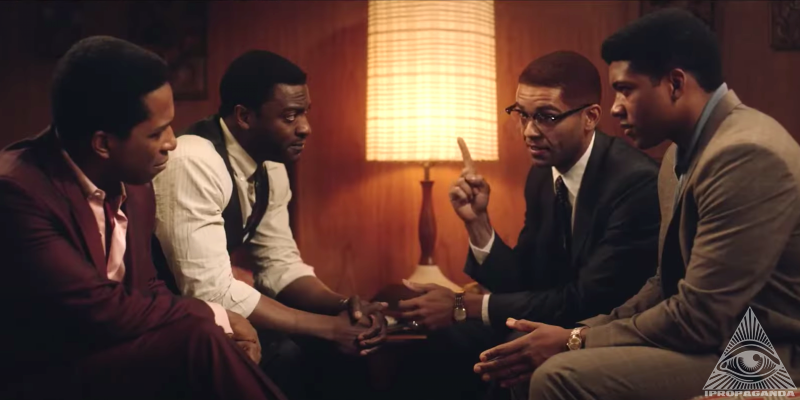
Directed by: Regina King
Written by: Kemp Powers
What does Black Power mean? Is it escaping generational cycles of oppression within our communities and within our homes? Is it financial freedom? Political power? Is it all of these things and a million more? The definition of Black power is as subjective as the perspective of the person seeking liberation through the empowerment of the self. To try and define Black Power as any one thing, strips it of its essential purpose -- to be born from and perpetuated by every person seeking freedom from the chains that are binding them. What does it mean to be a symbol of black power? Very few can claim to understand the burden that is heaped on the back of those labeled as “symbols” or “black excellence.” The four leads and the giants they portray, certainly do.
One Night in Miami, the feature directorial debut of Regina King, written by Kemp Powers (based on his play of the same name) is a fictional retelling of the night Cassius Clay (Eli Goree) celebrated his victory over Sonny Liston for the heavyweight championship of the world at the Hampton House motel with his three friends, Sam Cooke (Leslie Odom Jr.), Malcolm X (Kingsley Ben-Adir) and Jim Brown (Aldis Hodge). What follows is a thorough exploration of black masculinity, colorism, the expectations levied upon the successful, and the weight those we prop up bear in order to carve new paths for generations to follow. This is an excellent example of how to make a chamber drama that has the breadth and fluidity of real life. King’s stellar direction, paired with a fantastic screenplay by Powers, brings these larger-than-life figures down to earth by giving the actors the material to flex the depth of their talent and bring raw vulnerability to each of the characters. Her knowledge of cinema language is apparent, particularly in the boxing scenes, with each highlighting that King is either a fan of the sport or a fan of boxing films because the energy and tension are palpable. Give her a rocky spin-off and I’ll be excited by what she’d bring to the fights alone. That energy goes from the ring to the hotel as the interactions between these four men continue to escalate over the course of the night.
Each performer brings something unique to the table in how they represent a shade of the conversation surrounding blackness and these particular men's roles in shaping the future of the black community. I’m not familiar enough with any of the figures in the film, other than Muhammad Ali, to discuss whether the representation of them as people is accurate, however, as performers, they are each outstanding. Kingsley Ben-Adir brings a sensitivity to Malcolm X that gives him dimensions I’ve never seen portrayed, while Aldis Hodge’s measured Jim Brown filled me with admiration. Hodge is one of the most exciting actors working today and I cannot wait to see whatever he does next. He’s a giant that can bring humanity to anyone he plays and it genuinely inspires me. Eli Goree’s, Cassius Clay, felt like a caricature at times but that had more to do with the specific cadence that he adopted rather than his performance. As the film progressed and that normalized in my mind, he became Ali. Leslie Odom Jr. is a powerhouse in the film, not only in sparring matches with Ben-Adir but singing his own songs and damn near made me cry while doing it.
King clearly understood the strengths of her production. Time must have been spent on and offset building the chemistry between these actors because every time they’re on screen together they genuinely feel like old friends. If any of those four men walked into a room, guaranteed, the whole place turns and looks. They demand your attention for the entire duration of the film and that’s because King knows what makes a character compelling is not their overwhelming strength but what they do in the face of their weakness. Together these four are capable of lifting each other up in the way they attempt to uplift their communities and because of their unique stances in America at the time, they relate to each other in ways that feel organic to their group. More importantly, King never forgets to emphasize that no matter how important they may be in the black community, in America at large, they’re still not allowed in the front door. Their varying perspectives with regards to American society, influence, and responsibility are heightened by the tension of Malcolm X’s assassination. That shadow and King’s talent give her the ability to juggle the tone without undercutting the emotional content; giving the piece an overarching narrative that makes it feel large despite its intimacy.
This film is absolutely worth your time to watch and watch again. It is simultaneously a look into four very different perspectives on race in the ongoing tumult that is the battle for equality and a commentary on the humanity at the heart of powerful black men. Everyone is scared. Everyone feels the pressure to provide for their community and help the less fortunate. One way is not better than another and judging each other based on our own value systems without taking into account the struggles of others is not only small-minded, it’s reductive to the conversation.
I actually felt myself growing while watching this film and relating to this group of friends whose natural dispositions grow into conflicts that demand resolution. Who hasn’t had those long nights that turn into emotional explorations and relationship-defining revelations? Am I the only one that went to a liberal arts college?...
I would highly recommend One Night in Miami.
